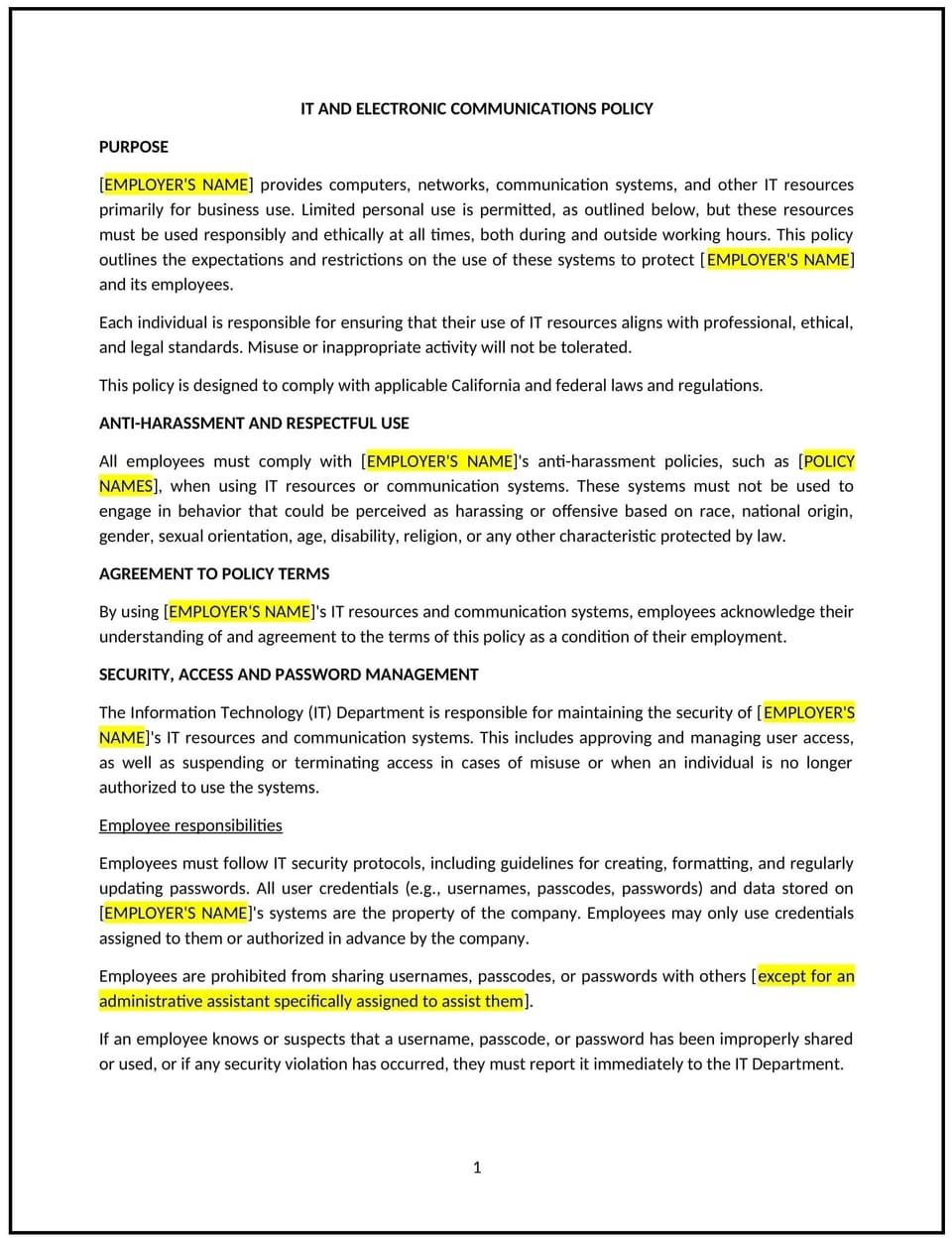IT and electronics communication policy (California): Free template

IT and electronics communication policy (California)
In California, an IT and electronics communication policy provides businesses with guidelines for the appropriate use of technology resources, such as computers, email, and internet access, while supporting compliance with state and federal laws, including privacy and cybersecurity regulations.
This policy outlines acceptable use, security protocols, and employee responsibilities. By implementing this policy, California businesses can safeguard sensitive information, promote productivity, and reduce legal and operational risks.
How to use this IT and electronics communication policy (California)
- Define acceptable use: Specify how employees can use business-provided technology, including email, internet, and devices, for work purposes.
- Establish security protocols: Outline measures to protect sensitive data, such as using strong passwords, enabling encryption, and following cybersecurity best practices.
- Address prohibited activities: Clearly state activities that are not allowed, such as accessing inappropriate websites, unauthorized downloads, or sharing confidential information.
- Communicate monitoring practices: Inform employees of the business’s right to monitor electronic communications while respecting California privacy laws.
- Provide reporting procedures: Encourage employees to report IT security concerns or suspected policy violations promptly.
Benefits of using this IT and electronics communication policy (California)
This policy offers several advantages for California businesses:
- Supports compliance: Reflects California laws governing data protection, cybersecurity, and workplace privacy.
- Protects assets: Safeguards business data, intellectual property, and IT systems from unauthorized access or misuse.
- Promotes productivity: Ensures technology resources are used effectively for business purposes.
- Reduces risks: Minimizes exposure to security breaches, legal liabilities, and reputational damage.
- Encourages accountability: Clarifies employee responsibilities for using IT and communication resources appropriately.
Tips for using this IT and electronics communication policy (California)
- Reflect California-specific laws: Address privacy considerations under the California Consumer Privacy Act (CCPA) and cybersecurity requirements.
- Train employees: Provide regular training on acceptable use, cybersecurity threats, and best practices for safeguarding business resources.
- Use monitoring tools responsibly: Balance monitoring needs with employee privacy rights, ensuring compliance with state regulations.
- Update protocols: Regularly review and enhance security measures to address evolving cybersecurity threats.
- Review regularly: Update the policy to reflect changes in technology, California laws, or business operations.
Q: How does this policy benefit the business?
A: This policy supports compliance with California laws, protects business assets, and ensures IT resources are used effectively for business purposes.
Q: What types of activities are prohibited under this policy?
A: Prohibited activities include accessing inappropriate content, sharing confidential data without authorization, and installing unapproved software.
Q: How does this policy support compliance with California laws?
A: The policy reflects state regulations, such as CCPA, ensuring lawful management of employee and business data.
Q: What steps should employees take to safeguard IT resources?
A: Employees should use strong passwords, avoid clicking on suspicious links, and report security concerns to the IT department.
Q: How can the business address policy violations?
A: The business can follow established procedures, such as issuing warnings or revoking access to IT resources, for violations of the policy.
This article contains general legal information and does not contain legal advice. Cobrief is not a law firm or a substitute for an attorney or law firm. The law is complex and changes often. For legal advice, please ask a lawyer.


